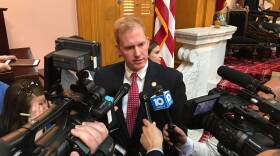Proposed changes are coming to an Ohio House-passed bill cracking down on the payday lending industry.
While one Republican Senator is hoping for a compromise, supporters of the original plan are not happy. Ohio Public Radio's Karen Kasler reports.
Changes in the House passed payday lending bill were expected, but Senator Matt Huffman of Lima showing up at this hearing to present them was a bit of a surprise. And some of what he said was too.
“There will be no more payday loans under my proposal.”
Huffman spoke to reporters after more than an hour of presenting his proposals and answering questions from Senators. They’re looking over a bill that was completely unchanged since it was introduced 15 months ago – which is very unusual, especially since a deal to alter it was scrapped in a House committee. One of Huffman’s biggest changes: “The minimum term will be 30 days. The classic payday loan will go away in Ohio.”
He’s also proposing a ban on interest-only loans, a maximum loan amount of $2500, a six-month maximum for loans under $500, a requirement that lenders to tell customers about other credit options and an increase in time to cancel loans.
Huffman would also erase the 28 percent interest rate cap, which opponents have said would kill the payday lending industry. He’s looking at an annual percentage rate of around 360 percent, which he says is what other states allow.
Huffman says his plan would cut off credit for some borrowers, but also says that the quick loan operators that he calls the “overbuilt big corporate lenders” will take a bashing. “We want to make sure the most abusive loans go away and we close the loophole, we give lots of borrower protections, ability to walk away, education, all of these sorts of things, but most people can still operate under this….we are going to be one of the more progressive states in the country regarding this particular issue.”
“I vehemently disagree and I’m sorry that he has that opinion because it is absolutely wrong,” said Nate Coffman, who speaks for the Ohio CDC Association, which supports the current House bill and is shocked by Huffman’s proposals. “They’re not consumer protections. They’re protections for the payday lending industry. They completely gut the bill and allow for this exploitation to continue. And it’s just incredibly upsetting especially when you look at the fact that this has been a very secretive process.”
Coffman has been working with Springfield Pastor Carl Ruby, who disputes nearly all of Huffman’s claims, especially the one saying if the current bill passes, most people won’t be able to get loans and the payday industry will shut down. “There’s still going to be payday loans stores. They’re still going to have access. That’s a scare tactic. If the payday lending industry were to create a bill, it would be the bill Sen. Huffman just suggested,” Ruby said.
All but one of those who testified at the Senate hearing support the House plan. That one was Ashish Gandhi. He owns a small payday lending operation called Cash Plus Silverton in Cincinnati. “I know the truth behind this law – the goal is to put us out of business. It always has been. This 13 page law that I read really could be one paragraph, and all that paragraph has to say is the max when can charge is a $20 monthly fee and 28 percent rate, period. That’s the end of the story, because that’s all it takes to put me out of business,” said Gandhi.
Huffman calls his changes an attempt to find the sweet spot between what other states are doing and the House plan. But one Senator noted that his changes are a significant rewrite of the bill – as lawmakers are trying to get away to campaign for this fall’s election. Ruby said he’s hopeful some sort of crackdown on payday lending will pass before the end of the session in December. “If they don’t, this issue is going to be hung over Republicans’ heads going into the fall, and they’re going to be known as the party that’s ok with 400%. So I think there’s an incentive for them to get this passed because they don’t want to own this in the fall.”
Huffman voted against payday lending regulation in 2008 and 2010. Ruby is calling on Senate President Larry Obhof to remove Huffman from talks surrounding the issue. And Ruby also says his group has a ballot initiative ready to go if the bill is significantly altered or doesn’t pass at all.












